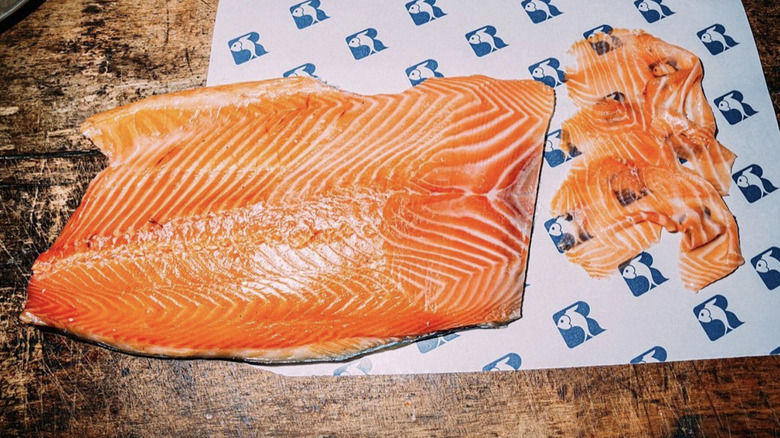What's The Difference Between Lox And Smoked Salmon?
If you ask a group of New Yorkers where in the city you can find the best smoked fish to top off your bagel, you'll hear at least three different superlatives. Longtime denizens of the Upper West Side will either swear by Barney Greengrass — a cash-only Jewish American culinary institution since 1908, where the servers have earned a curmudgeonly reputation adopted when customers can't tell their gravlax from their cured Nova Scotia (via the Michelin Guide). Others consider themselves die-hard loyalists to one of the neighborhood's other Jewish American culinary institutions, Zabar's, where the smoked fish clerk behind the counter has a habit of adopting the spend and diction of an auctioneer when the place hits peak hours. Meanwhile, residents of New York City's Lower East Side will point you to Russ & Daughters, whose prominence as an NYC cultural institution has inspired a scripted television drama that is, as of this writing, currently in pre-production (via the New York Post).
Wherever you get your bagel on any given morning, many would say it's incomplete without a generous cascade of bright orange lox — be it Nova, gravlax, or Scotch-cured. (Topping it with fixings like capers, sliced red onion, and dill is also highly recommended.) But how is lox different from smoked salmon, and why all this talk of New York? Well, the story of lox and the story of New York is almost impossible to untwine.
When it comes to salmon, curing and smoking are not one and the same
Niki Russ Federman, the current owner of Russ & Daughters — and the great-granddaughter of the eatery's founder, Joel Russ — explained the differences between lox and smoked salmon with Eater back in 2019. In order to understand the difference between the two, she clarified that one must first identify the difference between curing and smoking.
While curing is "a process in which a food is preserved in salt (and sometimes additional flavorings/aromatics)," per Eater, smoking consists of exposing food to — you guessed it — smoke, whether it's "cold smoke" or "hot smoke." Federman described cold-smoked salmon as "the stuff that can be sliced so thin you can read the Times through it," cured salmon as one with "a similar texture [to cold-smoked], but without any smoke flavor," and hot-smoked salmon as "meaty and flaky, like cooked salmon."
As for why New York City has always been such a hot spot for lox, Federman told Eater that in the days of yore, Pacific salmon was shipped to the East Coast in "gigantic salt baths," where it landed on the tables of Jewish immigrants. These were the days before home refrigeration and expedited shipping was a thing, so the salt acted as a means of long-term preservation. That saltiness may be the very reason we love cured and smoked salmon on bagels, as the salty fish "needed bread and dairy to cut it," according to Federman.
That lox you're eating probably isn't lox
It may seem ridiculous to be mad at a piece of salmon, but it has to be said: you might be peeved to learn that what has been advertised to you as salmon of the cured variety is actually smoked. According to Niki Russ Federman by way of Eater, that bagel and schmear you order regularly from your local spot is more likely draped atop a layer of cream cheese with cold-smoked salmon rather than lox, even if you're on the East Coast. "If someone over a certain age asks assertively for belly lox, we're not going to question him or her, but most people end up wanting one of our seven varieties of smoked salmon," Federman told Eater in 2019.
That being said, smoked salmon is by no means inferior to lox. Per the dish's Jewish origins, Federman relayed how putting stuff on bagels — i.e. "appetizing." per the local vernacular — is "the sister food tradition to deli," like pastrami and brisket. Since kashrut, the Hebrew word for kosher dietary law, prohibits Jews from mixing meat with dairy, bagels with schmear and lox (or smoked salmon) may have been created specifically for Jewish diners craving a cohesive and kosher bite of protein and dairy, considering fish does not fall under the kashrut guidelines for meat. Whatever the reason behind its origin, a bagel with fish is basheret — the Yiddish phrase for "destiny" — or, in other words, a perfect match.


